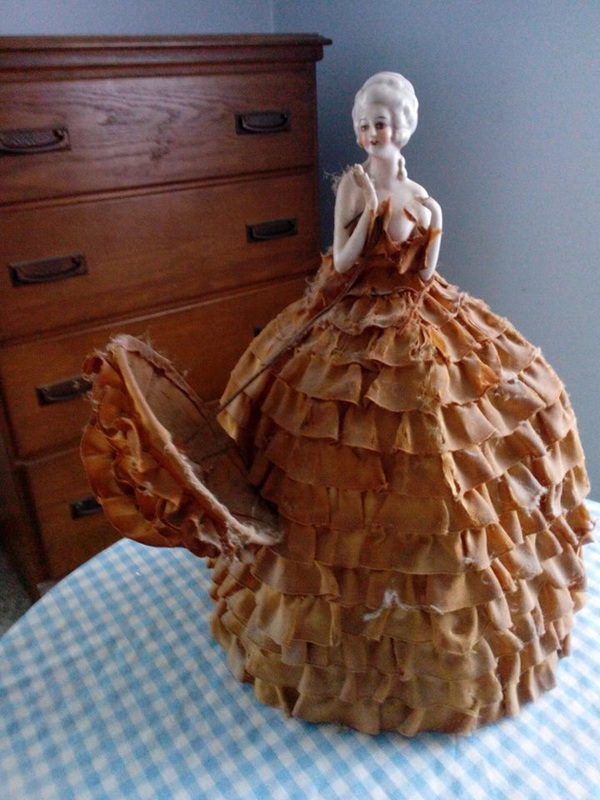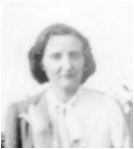|
I never knew the doll existed until my cousin Caryle came to a family get-together recently. I took the occasion to ask about our mutual grandmother, Irish-born, whom we all called Nana.
“I can’t remember her voice,” I told Caryle. “I can’t remember anything she said.” This is bothering me more, the older I get. I should have more memories, since my large family lived in Nana’s house in Queens, but she kept to herself, and bustled around to visit her old Irish lady friends in the city or Lake George, Sometimes she visited her sister in Brussels, where that family had been decimated for sheltering Scottish soldiers during World War Two. Caryle said she had only vague memories of Nana, since her own family moved around for work, and she rarely saw Nana. “But she gave me a present once,” Caryle added, brightening. Tell me about it, I said. After one of my grandmother’s post-war trips to visit her sister, Nana gave Caryle a doll that had belonged to our aunt, Florence Duchene, who died in Bergen-Belsen. Send me a photo when you get home, I asked Caryle. She did better, adding her lovely memories of the gift: “My parents and I went to see her off on the ship, when she was going to visit her sister in Brussels,” Caryle wrote. “She said she would have liked me to come with her. Which was not possible, but meant a lot to me. “When she came back from Brussels, she brought things back with her, one of them a doll that her niece Florrie made. I have always loved dolls, I don't know if she knew that, but she gave me the doll. I still have her, she is tattered, shows her age. But she is very special to me. “I am putting her picture on this little story. See her as I have always seen her, through my eyes with love.” The doll in the photo is porcelain, a beautiful woman. Florrie, who ran a millinery shop in the good days before the war, made the frilly dress. I was stunned to see a treasure from an aunt Caryle and I never met, an aunt who has taken on epic importance to me, along with her brother Leopold, who died soon after being rescued from a Nazi prison. Leopold lived long enough to receive a king’s medal for his heroism; Florrie’s name is engraved on a monument to the Belgian Resistance, in the Ixelles area of Brussels. (I wrote about Florrie and Rue Sans Souci in March, when contemporary terrorists brutalized Brussels.) As a young woman before the war, Florrie had fussed over the doll, created her wardrobe, perhaps smoothed her blonde hair, told her secrets, her hopes and dreams. Florrie and Leopold did not live long enough to marry, to have children. Nana has been gone over 60 years, and I cannot remember if her accent reflected her native Ireland, or her husband’s native Australia, or England where they lived, or New York, where they settled. There is so much I don’t know because I was too self-centered to ask, to listen. I do remember an old lady -- formidable, capable -- with white hair and black widow’s dresses, who took me to church and the luncheonette and sometimes to the movies and we would walk home together in the wintry darkness. That’s all I remember. Now I know the doll lives in Caryle’s home. Her children know the history, Caryle said.
Altenir Silva
9/12/2016 09:51:04 am
Dear George,
George Vecsey
9/12/2016 11:15:28 am
Dear Altenir: You are the movie maker.
Brian Savin
9/12/2016 07:31:58 pm
Guys with dolls. George, this is a beautiful story that brings tears. Thanks so much for sharing. Our family has a historic gift doll that is important to us, but our story is not nearly as compelling. Yours is beautiful.
George Vecsey
9/12/2016 11:13:37 pm
Brian, thanks. The nicest part was from Caryle. Without her feelings and writing, there was no story. GV
Brendan Buckley
9/13/2016 09:45:37 am
George, I share your frustration as memories fade and important stories are lost forever. I managed to video several hours of my Irish father recalling his boyhood in rural County Clare and his years as a war correspondent in Southeast Asia for Reuters, but my Australian born mother died unexpectedly, before I was able to sit her down to capture her recollections of working for the UN in its formative years. She traveled to DP camps in Europe, to Palestine and to SE Asia through the late 40's. I do have her letters home and plan to transcribe those one day, but I will always regret not having managed to save the stories in her voice.
George Vecsey
9/13/2016 11:29:59 am
Dear Brendan: Thanks for the touching note. Young people (which we were) are moving too fast toward the next thing. That is the way it is. Yesterday one grand-daughter got interested in my post, and I will show her a few books next time she comes over. The saddest part is when we have a chance to learn and don't. I visited Brussels, first trip to Europe, and passed up the suggestion by my parents that I visit a very close friend of the now-deceased family. How arrogant on my part. Fortunately, our older daughter did pass through Brussels years later and met an elderly couple that had known the family. MY wife took notes from her grandfather, which are paying off in genealogy searches now. Wish I had been that wise. Good luck, GV Comments are closed.
|
Categories
All
|












